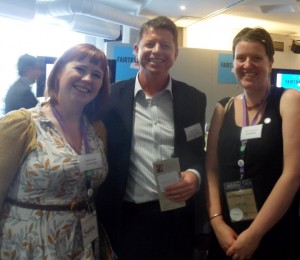Fair Future
A large contingent from Yorkshire went down to London for the Fair Future conference at the Queen Elizabeth II centre in Westminster on 15th October.
The first 20 years of the Fairtrade mark was celebrated and discussions took place on the challenges and future direction of the movement.
Activists, politicians (including Secretary of State for International Development, Justine Greening), business leaders and staff members of Fairtrade organisations from across the globe attended. Representatives from producer groups added their voice at the conference, including the charismatic, Chief Adam Tampuri, Chair of Fairtrade Africa Network and himself a cashew and shea nut producer in Ghana.

Sophie and Helen from Fairtrade Holme Valley with Professor Bob Doherty of the University of York (centre).
Other speakers at the conference included CEO of Fairtrade International, Harriet Lamb and Gabriel Marques-Worssam, of Fair Trade Wales, who answered questions about engaging young people in Fair Trade and trade justice issues. One of the best known faces at Fair Future was BBC’s ‘The Apprentice’ advisor, Nick Hewer. He gave the Yorkshire contingent a quizzical look but thankfully didn’t advise any firings to take place. Nick gave a passionate talk about conditions for banana farmers in St. Lucia. Speaking from his knowledge of the people that he had met in St. Lucia, he knew how tough life could be for these farmers, particular when the price paid to them is being squeezed, because of supermarket price wars in the UK and other western countries. He called for supermarkets to stand by fair practice and abolish the days of the unfair banana.
Dr. Nyagoy Nyong’o, Director of Fairtrade Africa, spoke of the problems agriculture in the global south faces because so many young people are leaving the land. Farming is regarded in many countries as an older person’s profession. This may store up big problems for the global food supply, unless farming is made a more tempting career for future generations. Fairer prices paid for produce and better working and living conditions must form part of the solution.

